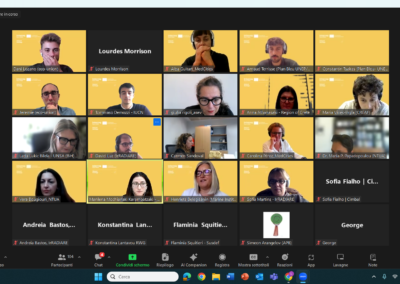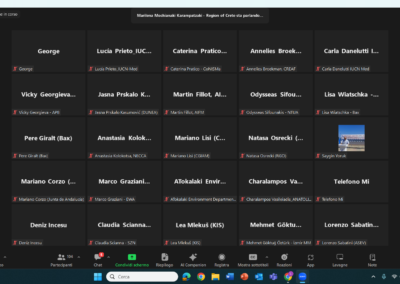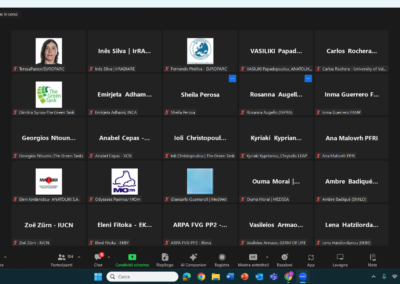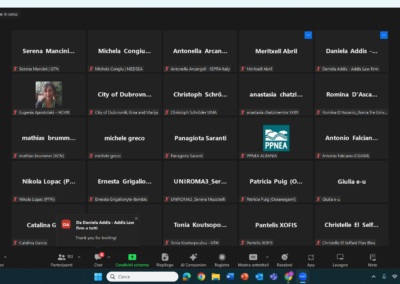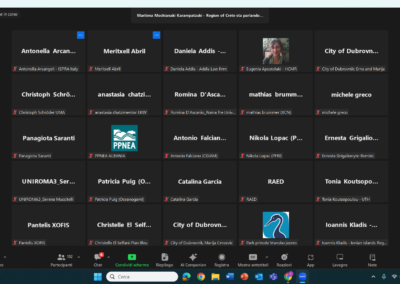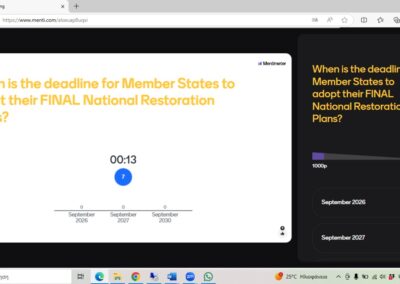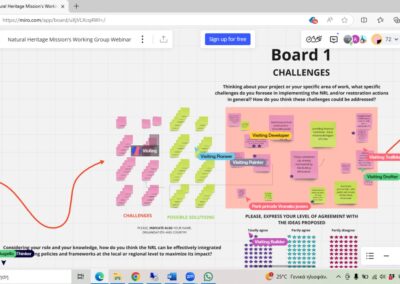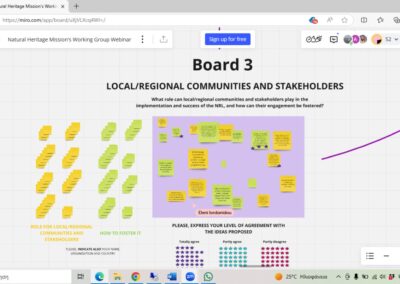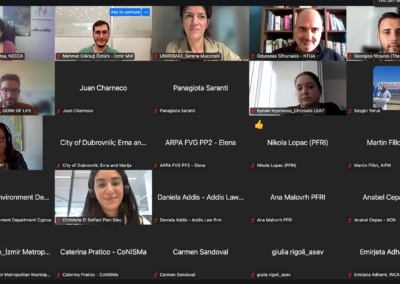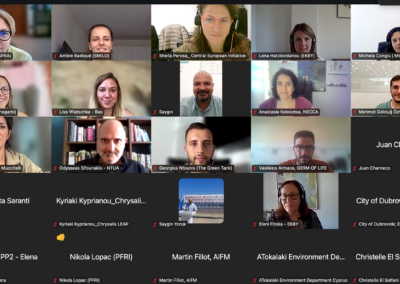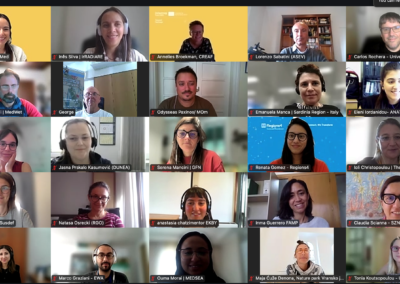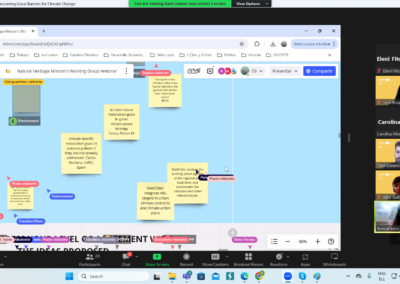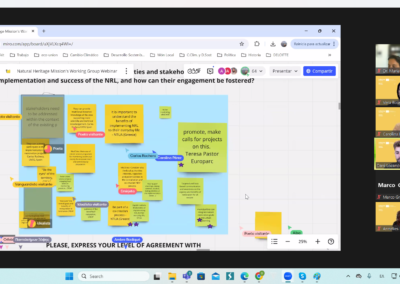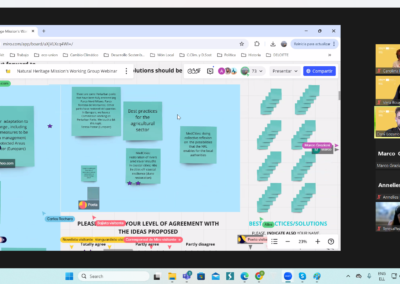On October 8, 2024, the Mission for Natural Heritage hosted the 2nd online Working Groups’ webinar. Almost one hundred representatives gathered, including representatives of the Thematic Projects, Mission’s Project Partners and Associated Partners, in order to support capacity-building efforts aiming to enhance understanding and collaboration around the implementation of the EU Nature Restoration Law (NRL) and the Global Biodiversity Framework (GBF) in the Mediterranean region.
The webinar focused on achieving three key objectives:
- Enhance Understanding of the NRL and GBF: Providing a comprehensive and didactic overview of the NRL, focusing on its objectives, key provisions, and implications for nature restoration in the Mediterranean, while addressing the challenges of its implementation. Providing an overview of the GBF and its implementation, and the update of the National Biodiversity Strategies and Action Plans (NBSAPs). Understanding the linkages between the NRL and the GBF.
- Facilitate Knowledge Exchange and Best Practices: Promoting active reflection and dialogue among participants on practical solutions, experiences, and best practices, relevant to the four Working Groups, fostering collaboration and knowledge-sharing.
- Develop Preliminary Positions for NRL Implementation: Engaging participants in thematic working sessions to discuss and draft preliminary conclusions and actionable insights that will inform the development of a common policy document on the effective implementation of the NRL.
The event featured both plenary and breakout sessions:
Plenary Session: The session covered the law’s significance for biodiversity restoration in the Mediterranean and outlined the policy’s key challenges. Mentimeter was used throughout to gather real-time feedback and assess participants’ understanding of the content.
Breakout Sessions (Thematic Working Groups): After the plenary, participants joined one of four thematic Working Groups, each focusing on different aspects of biodiversity and ecosystem restoration:
- WG1: Area-based Conservation
- WG2: Overcoming Local Barriers for Climate Change Adaptation
- WG3: Evaluating the Socio-Economic Value of Biodiversity
- WG4: Ecosystem Resilience through the Promotion of Ecosystem Restoration and Nature-based Solutions
In each Working Group, facilitators guided discussions using four key questions:
- Considering your role and your knowledge, how can the NRL be effectively integrated into existing policies and frameworks at local or regional level to maximize its impact?
- Thinking about your project or your specific area of work, what specific challenges do you foresee in implementing the NRL and/or restoration actions in general? How do you think these challenges could be addressed?
- What specific actions/recommendations can this Working Group put forward to support the implementation of the NRL targets related to your thematic focus? What best practices/solutions should be highlighted?
- What role can local/regional communities and stakeholders play in the implementation and success of the NRL, and how can their engagement be fostered?
Participants used Miro boards for real-time brainstorming and visual mapping of ideas. This tool helped structure discussions around solutions, best practices, and challenges, as well as capturing key recommendations and preliminary conclusions, allowing participants to continue refining their ideas after the session.
Presentation of Results: Following the breakout sessions, the leaders of each Working Group presented their findings and preliminary conclusions to the full group, summarizing key insights and proposed solutions for supporting the NRL’s effective implementation in the Mediterranean region.
The participants in the webinar were also introduced to the newly designed clusters and clustering activities, part of the Mission’s Amplification Room, aiming to support the transfer and adoption of the results of the Thematic Projects. An introductory presentation was made, followed by supporting information to introduce this new activity to the Community of Practice with more information and exciting clustering activities yet to come.
Closing Remarks and Next Steps: The webinar concluded with a discussion of the next steps, including the drafting of a policy document based on the insights gathered during the sessions. This paper will be presented and finalized at the Annual Institutional Dialogue in Málaga in November 2024 and disseminated and included in the policy agenda throughout 2025.
For specific information on each group, you can reach out to the following focal points:
Working Group 1 on Area-based Conservation:
IUCN – Carla Danelutti (Carla.DANELUTTI@iucn.org) and Lucía Prieto (lucia.prieto@iucn.org)
Working Group 2 on Overcoming Local Barriers for Climate Change Adaptation:
MedCities – Carolina Pérez (cperezv@medcities.org) and Alba Guitart (aguitart@medcities.org)
Working Group 3 on Evaluating the Socio-Economic Value of Biodiversity:
Marine Institute – Peter Mackelworth (peter.mackelworth@blue-world.org) and Henrieta Belegisanin (henrieta.belegisanin@marineinstitute.eu)
Working Group 4 on Ecosystem Resilience through the Promotion of Ecosystem Restoration and Nature-based Solutions:
Plan Bleu – Arnaud Terrisse (aterrisse@planbleu.org) and Constantin Tsakas (ctsakas@planbleu.org)

